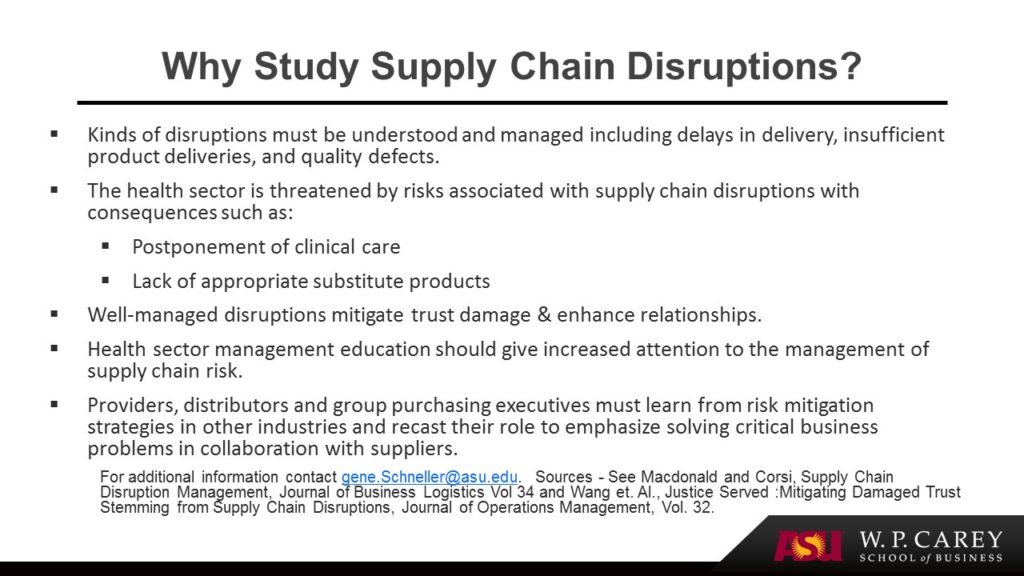From the Health Sector Supply Chain Research Consortium (Eugene Schneller, Director), CAPS Research & Arizona State University, W. P. Carey School of Business
Contact: Eugene Schneller, gene.schneller@asu.edu
Eugene Schneller is an experienced academic leader, researcher, and administrator with extensive experience at the university, college, and departmental levels. As Associate Dean of the College of Business at Arizona State University (ASU), he was responsible for operations of one of the largest colleges of business in the United States.
Abstract
What is the message?
- Supply chain disruptions are especially threatening in the health sector, where the delayed deliveries and lack of substitute products may mean postponing patient care. The most critical factor in managing supply chain disruptions is discovery speed. In turn, buyers are most likely to maintain relationships with suppliers that actively involve themselves in identifying problems and managing recovery from disruptions, using strategies that focus on maintaining a buyer’s trust in the supplier’s ability.
What is the evidence?
- Scrutinizing how firms outside the health sector manage disruptions offers important lessons for health sector leaders. Two studies of supply chain disruptions examine the costs of the problems and the effectiveness of different approaches to recovering from the disruptions.
Links: Slide
Submitted: August 20, 2016; Accepted after review: October 30, 2016
Cite as: Eugene Schneller. 2017. Strategies for Dealing with Supply Chain Disruptions. Health Management Policy and Innovation, Volume 2, Issue 1.
|
Introduction
Supply chain disruptions in healthcare such as recalls and shortages of pharmaceutical and medical/surgical products commonly harm clinical quality, regulatory compliance, and patient safety (see Figure 1). Even with sound risk management practices, severe disruptions can arise unexpectedly. Healthcare professionals need to establish flexible processes to identify and manage supply chain disruptions once they occur. This article summarizes recent research on managing supply chain disruptions.
Supply chain disruptions move through four phases: (1) the disruption event, (2) discovery of the event, (3) recovery from the disruption, and (4) redesign of the supply system. Although each phase requires thoughtful attention, the most critical factor in managing disruptions is often discovery speed. Following supplier-induced disruptions, suppliers benefit from using procedural justice strategies that restore buyers’ trust in their abilities.
Studies
Study 1: Managing supply chain disruptions
Study context: This study examined 34 supply chain disruptions from 17 firms, each of which experienced a well-managed supply chain disruption and a disruption that could have been managed better (MacDonald & Corsi, 2013).
Findings: Supply chain disruptions such as product recalls and quality failures are particularly challenging to address. Such internal disruptions commonly take substantial time to discover, face slow recovery times after discovery, and require large buyer-supplier recovery teams that are difficult to manage. Disruptions that are slow to discover incur particularly large financial costs. Firms that actively monitor supply chain activities are best able to discover problems early and then determine the disruption’s root causes. Early identification and diagnosis then facilitate smooth recovery.
Study 2: Mitigating damaged trust resulting from disruptions
Study context: This study examined 604 supplier-induced disruption incidents from Chinese manufacturers, including delivery delays, delivery shortages, and major quality defects. The researchers used organizational justice theory to examine how approaches suppliers used to resolve the disruptions affected buyers’ trust in the buyer-supplier relationships and, in turn, whether the relationships continued (Wang, Craighead, and Li, 2014).
Findings: Buyers were most likely to maintain relationships with suppliers that actively involved themselves in managing recovery from the disruption. Supplier strategies that focused on maintaining a buyer’s trust in the supplier’s ability (procedural justice) were most successful in limiting damage to trust. By contrast, simply encouraging buyers to support the suppliers (conserve supplier benevolence) did not help maintain a relationship.
Summary
Supply chain disruptions can spill down the value chain far beyond the initial problems. Both parties in a buyer-supplier relationship need active processes for identifying problems quickly, diagnosing the causes of the disruptions, and addressing the root causes. In doing so, suppliers need to focus on maintaining buyers’ confidence in their capabilities and their ability to avoid future problems.
REFERENCES
Macdonald, J. R., & Corsi, T. M. 2013. Supply Chain Disruption Management: Severe Events, Recovery, and Performance. Journal of Business Logistics, 34(4), pages 270–288.
Wang, Q., Craighead, C. W., & Li, J. J. 2014. Justice served: Mitigating damaged trust stemming from supply chain disruptions. Journal of Operations Management, 32(6), pages 374–386.
The Health Sector Supply Chain Research Consortium
The Health Sector Supply Chain Research Consortium (HSRC) is an Industry Advisory Group within CAPS Research. CAPS Research is jointly sponsored by member companies, the W. P. Carey School of Business at Arizona State University, and the Institute for Supply Management®(ISM®). HRC was founded in 2004 to bring together health sector organizations and academic researchers to conduct research on topics related to the strategic management of the health care supply chain. HSRC embodies:
- Research– We engage in cutting-edge research led by scholars from universities across the globe. We also monitor monitoring health care supply chain trends and engage in benchmarking.
- Thought Leadership –We function as a boiler room for new ideas to drive excellence and innovation in the health care supply chain.
- Collaboration– Our research is developed through collaboration with member organizations representing multiple stakeholders across the health care supply chain.
- Industry Guidance– HSRC research is responsive to industry needs and provides guidance and opportunity to raise the standard of management and policy practice surrounding the health care supply chain.
For more information, visit: http://www.capsresearch.org/health-sector-advisory-group/ or https://wpcarey.asu.edu/research/health-supply-chain
Contact: gene.schneller@asu.edu or (602) 320-1512

